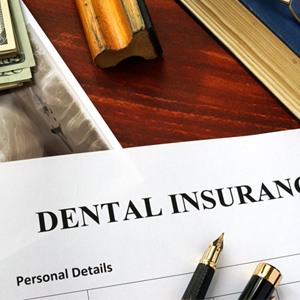Traditional Braces – West Mobile, AL
Affordable, Reliable, & Comfortable Orthodontics

Despite the countless advances made in dentistry over the last few decades, traditional metal braces are still one of the most dependable ways to straighten the teeth. Luckily, they are very different from the bulky, noticeable ones you likely saw growing up. Traditional braces in West Mobile from Parker Dental & Orthodontics are more subtle and comfortable than ever before, and we’ve used them to help countless patients of all ages get the stunning smiles they desire.
How Do Traditional Braces Work?

The basic principle of braces is that they apply a small amount of consistent pressure to the teeth in order to shift them. This is done by placing an archwire along both rows of teeth, and these are held in place by brackets attached to each tooth. Over the course of treatment (which can last anywhere from six months to two years), this wire will be adjusted slowly but surely to bring the teeth into their ideal positions.
What Orthodontic Issues Can Braces Fix?

One of the best things about braces is that they can help with both simple and complex orthodontic needs with incredible consistency.
Crowded & Crooked Teeth
Whether your teeth overlap or are rotated, braces can create the necessary space to achieve a balanced and attractive look.
Gapped Teeth
Unwanted gaps increase the risk of gum disease while also negatively affecting someone’s appearance, but braces are great at closing spaces and making sure they stay gone.
Bite Misalignment
On top of addressing issues that affect individual teeth, braces can fix things like underbite, overbite, crossbite, and open bite that can lead to jaw/facial pain as well as a less-than-perfect facial profile.
Caring for Your Braces

Braces are relatively low maintenance when compared to clear aligners, but a few practices do need to be followed to ensure a patient has a smooth journey throughout their treatment. Keeping up with brushing and flossing at home is paramount to avoid cavities that can derail someone’s timeline, and in that spirit, a patient should also avoid really sticky or chewy foods that could dislodge a bracket. Most importantly, a patient needs to attend their regular progress checks with their dentist—that way, any potential issues or adjustments can be made before they cause any real trouble.
Understanding the Cost of Traditional Braces

The cost of traditional braces varies greatly due to several factors unique to each patient. During your consultation, your dentist or orthodontist will assess these variables to provide an estimate. However, understanding some basic information beforehand can be helpful; with than in mind, here are some of the factors that could potentially affect the cost of your traditional braces.
Factors That Affect the Cost of Traditional Braces

Several factors contribute to the cost of traditional braces. The severity of misalignment determines the complexity of treatment and, consequently, the expense of the treatment. Longer treatment durations require more frequent adjustments and supplies, increasing overall costs. For this reason, adult patients may incur higher expenses as their teeth are more firmly set in the jawbone. Additionally, the number of follow-up appointments impacts overall expenses, as braces need regular adjustments in order for progress to continue. Supplementary orthodontic devices like retainers or expanders further elevate costs. Compliance with treatment guidelines is crucial; failure to adhere to prescribed procedures can prolong treatment and increase expenses. Understanding these factors helps patients anticipate the financial commitment associated with traditional braces.
Professional Braces vs. “DIY” Braces: Which Costs More?

Opting for a "do-it-yourself" (DIY) approach to orthodontic care may seem cost-effective initially, but it can lead to significant long-term consequences. DIY braces, made from household items, pose risks to oral health and may result in additional expenses to correct damages. Professional braces, though they may seem pricier upfront, offer effective and safe treatment under the guidance of orthodontic experts. Choosing professional braces from the start can prevent future complications and expenses associated with DIY methods. By prioritizing long-term oral health over short-term savings, patients can avoid potential financial burdens and ensure successful orthodontic outcomes.
Does Dental Insurance Cover Braces?

Dental insurance coverage for braces varies, with some plans including orthodontic treatment and others omitting it. Coverage often applies to medical necessity rather than solely cosmetic concerns, and it's more common for plans to serve patients under 18.
Usually, you can expect around 50% of the cost of your services to be covered. Health Savings Accounts (HSAs) or Flexible Spending Accounts (FSAs) may help offset costs. Feel free to consult with our dental team if you want to learn more about the financial options afforded to you.
Options for Making Braces Affordable

If you don’t have insurance, that’s okay; we have options that can potentially make the treatments you receive from us more easily fit your budget.
For one, we have in-house dental plans that afford you all kinds of preventive and periodontal services for a flat annual fee. While this won’t affect the cost of your braces, it may make any preliminary treatments you receive from us more affordable.
We also frequently work with CareCredit, which is a financier that can allow you to split up the cost of your services across several months. If you’re concerned about paying for your orthodontic care all at once, this could be an excellent option for you.
Feel free to give us a call if you have questions about this or any other financial option available to you.
Traditional Braces FAQs
Do Traditional Braces Hurt?
To be honest… orthodontic treatment of any kind comes with some discomfort. Your teeth are moving into entirely new positions, after all! That said, the soreness that you experience will be temporary, and there are a few steps you can take to alleviate it. That includes eating soft foods, taking OTC pain medication as directed, and rinsing with warm saltwater periodically.
Note: If your gums, lips, or tongue are irritated from the brackets or wires, then you can use dental wax! Simply pinch off a piece and place it over the sharp edge – that’s it!
Why Do My Teeth Feel Loose with Braces?
If your teeth feel slightly loose from time to time throughout your orthodontic treatment, don’t panic. This is completely normal and a sign that your teeth are moving into their properly aligned positions! Of course, if they feel like they are so loose that they are about to fall out, that’s a different story. In that case, you should call us ASAP to schedule an emergency exam.
Am I Too Old to Get Braces?
Patients often assume that there comes a time when they are simply “too old” for braces. That’s not the case. In fact, patients in their 30s, 40s, 50s, and even 60s pursue orthodontic treatment! So, if you think that the ship has sailed on having straight teeth, it hasn’t. The best way to find out if you’re a candidate is by visiting our West Mobile dental office so we can learn about your dental history and existing orthodontic problems.
Can I Get Traditional Braces on Just My Top or Bottom Teeth?
There are some cases where single-arch treatment is possible. That said, they are few and far between. That’s because the position of your teeth affects your bite. In other words, if we move one row of teeth but not the other, you might end up experiencing consequences like difficulty chewing properly. To prevent that from happening, we need to complete a comprehensive exam in order to determine the complexity of your case and exactly what’s needed to address the existing orthodontic problem(s).
What Happens After You Get Your Braces Off?
The end of your time with braces starts your time with a retainer! This orthodontic appliance plays a crucial role in preventing orthodontic relapse, which is when your teeth move back into their misaligned positions. For that reason, we will give you specific instructions on how often to wear it and how to take care of it so you don’t have to order a replacement anytime soon.
Can I Chew Gum with Traditional Braces?
No, you shouldn’t chew gum with traditional braces. If you do, then a bracket or wire could come out of position, requiring an emergency visit to our office. In fact, we don’t recommend eating anything especially chewy for that reason, like caramel candies.

